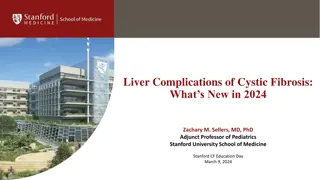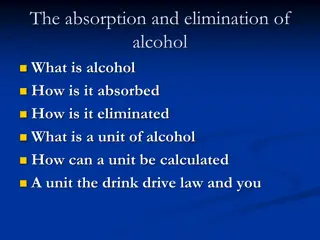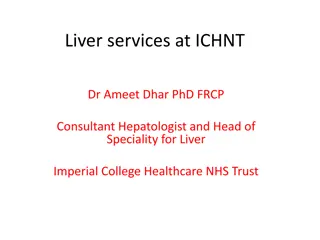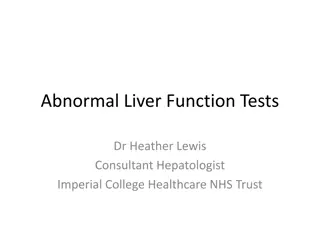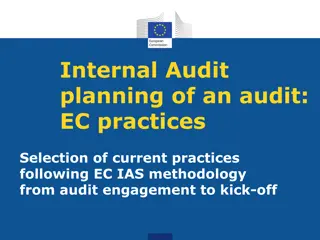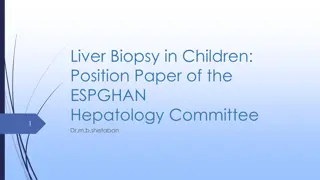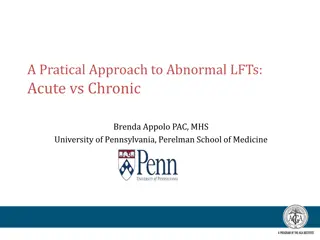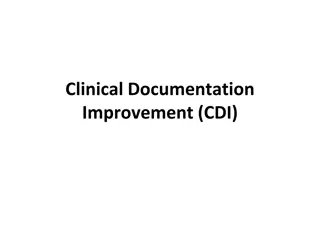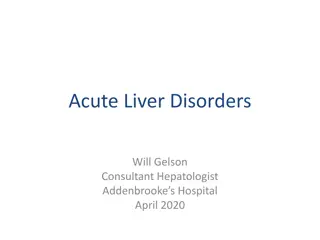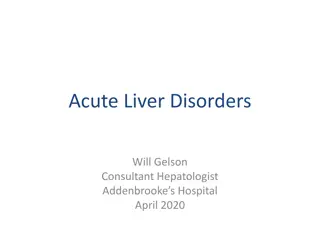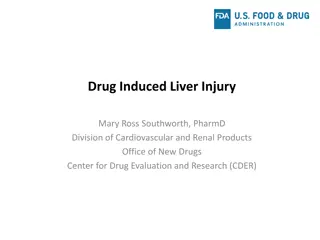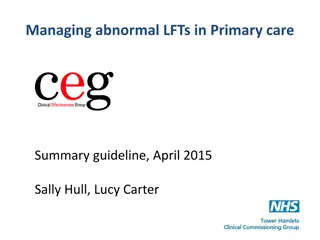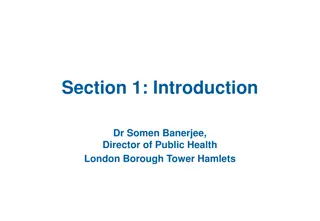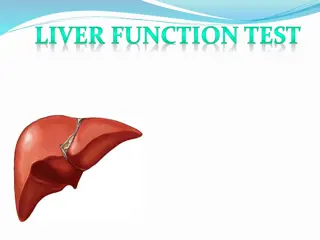National Audit on Inpatient Care for Alcohol-Related Liver Disease in the UK
This national audit aims to evaluate the current provision of inpatient care for patients with Alcohol-Related Liver Disease (ARLD) in the UK, identify areas for improvement, and assess factors influencing care outcomes. The audit includes specific criteria for patient identification and site eligibility, involving various healthcare professionals and networks to gather data. By addressing significant shortcomings in the quality of care, this audit seeks to improve the management of ARLD and reduce related mortality.
Download Presentation

Please find below an Image/Link to download the presentation.
The content on the website is provided AS IS for your information and personal use only. It may not be sold, licensed, or shared on other websites without obtaining consent from the author. Download presentation by click this link. If you encounter any issues during the download, it is possible that the publisher has removed the file from their server.
E N D
Presentation Transcript
Alcohol related LivER disease audiT : ALERT-UK A national audit of provision of inpatient care for patients with ArLD in the UK. 2024 alertaudituk@gmail.com
Background Significant shortcomings in the quality of inpatient care . Allison M et al Deaths from alcohol-related liver disease in the UK: an escalating tragedy. Lancet. 2023;401(10375):418-20 NCEPOD. Remeasuring the Units An update on the organization of alcohol-related liver disease services. 2022 Parker R, Allison M, Anderson S, Aspinall R, Bardell S, Bains V, et al. Quality standards for the management of alcohol-related liver disease: BMJ Open Gastroenterol. 2023;10(1)
Aims 1.Evaluate current service provision for inpatients with ARLD in the UK against defined quality standards 2.Identify areas of care for targeted improvement Secondary objectives: To identify any patient-related factors or institution-related factors associated with provision of inpatient ARLD care and outcomes
Site Eligibility All UK acute hospitals caring for inpatients with ArLD Site recruitment via : BSG and BASL website link Hepatology and alcohol nursing networks National and local trainee networks Social media Site data collection team: Designated site lead Up to 4 further team members ( e.g. alcohol team, specialist nurses, trainees)
Patient Identification Inclusion criteria First 20patients in study period Reach end of admission episode (discharge/transfer/death) between 1st July 2022 30th September 2022 (inclusive) ARLD as a Primary or Secondary diagnosis Exclusion criteria Patients under 18 years of age Patients on EOLC pathway prior to or within 24 hours of admission Patients transferred from another centre for specialist service/ procedure Active non-hepatic malignancy or metastatic liver cancer
Patient Identification Identification Pre coded spreadsheet to apply Liverpool Alcohol related liver disease Algorithm (LAA) : 1. ARLD-specific code recorded as primary diagnosis (ARLD-primary) 2. ARLD-specific code recorded as secondary diagnosis. All higher order diagnoses must be either: A) Symptom, sign or complication (jaundice, varices, acute kidney injury, encephalopathy and other relevant diagnoses suggesting admission for ARLD complications), Or B) Other alcohol-specific diagnosis (codes for other alcohol specific disorders such as alcohol intoxication, withdrawal, and organ- specific disorders, e.g. alcoholic gastritis) 3. Nonspecific liver disease recorded as a primary diagnosis (codes for liver disease without specific aetiology, e.g. cirrhosis unspecified) All lower order diagnoses must be either: A) Symptom, sign or complication, Or B) Other alcohol-specific diagnosis (at least one must be recorded) 4. Nonspecific liver disease recorded as a secondary diagnosis All higher order diagnoses must be either: A) Symptom, sign or complication, Or B) Other alcohol-specific diagnosis (at least one must be recorded) Dhanda A et al. The Liverpool alcohol-related liver disease algorithm identifies twice as many emergency admissions compared to standard methods when applied to Hospital Episode Statistics for England. Aliment Pharmacol Ther. 2023;57(4):368-77.
Methods : Data Collection Site level data at registration Anonymised individual level data extracted from EHR or paper notes : Demographic data Assessment of AUD management - withdrawal management, involvement of designated alcohol care team , use of relapse prevention medication Discharge planning and follow up Disease severity variables Outcomes at 1 year : including clinic attendance, consideration for transplant suitability and palliative care involvement
Dissemination Published under collective group name ALERT UK All contributors will be recognised as formal collaborators Steering group Name Affiliation Role on committee Ashwin Dhanda University of Plymouth Lead Laura Burke Leeds Teaching Hospitals Trainee Co-Lead Vikram Bains Cambridge University Hospitals Trainee Co-Lead Dianne Backhouse Hull University Teaching Hospitals Nurse Lead Ewan Forrest Greater Glasgow and Clyde Scotland Co-Lead Mhairi Donnelly Royal Infirmary of Edinburgh Scotland Co-Lead Keith Bodger University of Liverpool LAA tool implementation Conor Braniff Belfast Trust NI Co-Lead Roger McCorry Belfast Trust NI Co-Lead Arj Singanayagam St George s Hospital London/South of England Lead Andrew Yeoman Aneurin Bevan Wales Lead Richard Parker Leeds Teaching Hospitals North of England Lead
To register: 1. Follow QR code or link to register your hospital( 1 per site) 2. On receipt of your registration form, the local audit lead will be sent a pre coded spreadsheet with instructions to send to your local data team. This will identify your list of 20 patients for inclusion with an end of admission date during the period 1st July 2022 30th September 2022 (inclusive). A link to the online data collection form will be sent to the audit lead (1 form per patient to be completed). 3. Please also register ALERT-UK with your local organisation's audit department. A single page project summary and the HRA decision tool outcome is available to download below to support your local registration process. https://forms.gle/VCgbhYT6te2BiQ5k9 If you have any questions, please contact us at alertaudituk@gmail.com





